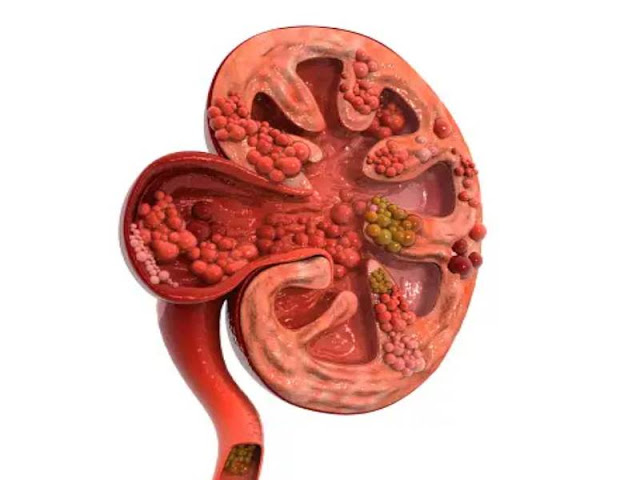Featured
- Get link
- X
- Other Apps
Polycystic Kidney Disease (PKD):
_.jpg)
Genetic Causes, Symptoms, and Treatment Approaches
Polycystic Kidney Disease (PKD) is a genetic disorder characterized
by the formation of fluid-filled cysts in the kidneys. These cysts can grow
over time, causing the kidneys to enlarge and lose function. PKD can lead to
various complications and, in severe cases, kidney failure. In this article, we
will explore the genetic causes, symptoms, and treatment approaches for
Polycystic Kidney Disease.
Genetic Causes:
PKD is primarily caused by mutations in specific genes.
There are two main types of PKD, each with its genetic basis:
- Autosomal
Dominant Polycystic Kidney Disease (ADPKD): This is the most common
form of PKD and is caused by mutations in either the PKD1 or PKD2 genes.
In most cases, ADPKD is inherited as an autosomal dominant trait, meaning
that an affected individual has a 50% chance of passing the mutated gene
to their offspring. PKD1 mutations are more prevalent and tend to result
in more severe symptoms.
- Autosomal
Recessive Polycystic Kidney Disease (ARPKD): ARPKD is a rarer form of
PKD and is caused by mutations in the PKHD1 gene. Unlike ADPKD, ARPKD is
inherited as an autosomal recessive trait, meaning that both parents must
carry a copy of the mutated gene to have an affected child. Individuals
with ARPKD typically present with symptoms in early childhood.
Symptoms:
The symptoms and complications of PKD can vary depending on
the type of the disease, the age of onset, and the severity of cyst
development. Common symptoms and complications of PKD include:
- Kidney
Enlargement: Cysts in the kidneys can lead to kidney enlargement,
which can cause abdominal or flank pain and discomfort.
- High
Blood Pressure (Hypertension): PKD can result in elevated blood
pressure, which, if left untreated, can further damage the kidneys.
- Kidney
Stones: The presence of cysts in the kidneys can increase the risk of
developing kidney stones.
- Urinary
Tract Infections (UTIs): Frequent UTIs can occur due to cysts
interfering with the urinary tract.
- Hematuria:
Blood in the urine is a common symptom of PKD.
- Proteinuria:
Protein leakage into the urine may be a sign of kidney damage.
- Liver
Cysts: In some cases, individuals with PKD can develop cysts in the
liver, leading to hepatomegaly (enlarged liver).
- Cystic
Intracranial Aneurysms: In ADPKD, there is an increased risk of
developing aneurysms in the brain's blood vessels, which can lead to
potentially life-threatening complications such as bleeding or stroke.
- Cardiovascular
Complications: PKD can increase the risk of heart valve disorders and
other cardiovascular issues.
- Kidney
Function Decline: As cysts continue to grow and multiply, kidney
function may decline over time, ultimately leading to kidney failure.
Treatment Approaches:
The treatment and management of PKD primarily aim to control
symptoms, reduce complications, and slow the progression of kidney damage. The
treatment approaches for PKD may include the following:
- Blood
Pressure Control: Managing high blood pressure is essential to reduce
the risk of further kidney damage. Medications, lifestyle modifications,
and dietary changes may be recommended.
- Pain
Management: Over-the-counter or prescription medications can help
alleviate pain or discomfort associated with kidney enlargement or
cyst-related complications.
- Treatment
for Complications: Treating complications such as UTIs, kidney stones,
and heart valve issues is an integral part of PKD management.
- Diet
and Lifestyle Changes: A low-salt diet, reduced protein intake, and
adequate hydration may be recommended to support kidney health and manage
PKD-related complications.
- Monitoring
and Screening: Regular monitoring of kidney function, blood pressure,
and urine tests can help track the progression of the disease and identify
any complications.
- Cyst
Drainage: In some cases, cysts that cause significant pain or
complications may be drained or surgically removed.
- Dialysis:
In advanced cases of PKD, when kidney function significantly declines,
dialysis may be required to filter waste and excess fluid from the blood.
- Kidney
Transplant: For individuals with end-stage renal disease (ESRD),
kidney transplantation is a treatment option that can provide a new,
healthy kidney to replace the non-functioning kidneys.
Research and Treatment Advances:
Research into PKD is ongoing, and there have been
significant developments in understanding the genetic and molecular mechanisms
of the disease. Some of the promising areas of research and potential treatment
advances include:
- Genetic
Therapies: Efforts are underway to develop gene therapies that target
and correct the genetic mutations responsible for PKD, potentially slowing
or preventing the progression of the disease.
- Vasopressin
Antagonists: Medications known as vasopressin antagonists can reduce
fluid retention and slow the development of kidney cysts in some
individuals with ADPKD.
- Inhibitors
of Cyst Growth: Several medications and compounds are being
investigated for their potential to inhibit cyst growth and improve kidney
function.
- Personalized
Medicine: Research is focused on identifying specific genetic and
molecular markers that can help tailor treatments to individual PKD cases,
allowing for more precise and effective interventions.
- Clinical
Trials: Ongoing clinical trials are testing new drugs and treatments
for PKD, offering hope for more effective therapeutic options in the
future.
The Future of PKD Management:
As research in PKD continues to progress, the outlook for
individuals with this condition is becoming more promising. Advances in genetic
therapies, personalized medicine, and disease-specific treatments offer hope
for more effective management and improved outcomes.
Moreover, increased awareness and support from patient
advocacy organizations are helping individuals and families affected by PKD
access the latest information, care, and resources.
In conclusion, Polycystic Kidney Disease (PKD) is a genetic
disorder characterized by kidney cysts and associated complications. While
there is no cure for PKD, various treatment approaches are available to manage
symptoms, reduce complications, and slow the progression of kidney damage.
Ongoing research and clinical trials hold promise for more effective therapies
and improved outcomes for individuals with PKD.
- Get link
- X
- Other Apps
Popular Posts
Recommendations on how to make your child more active
- Get link
- X
- Other Apps

